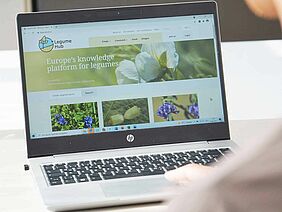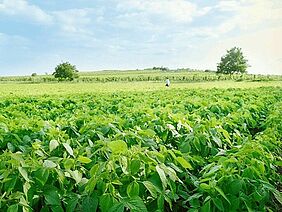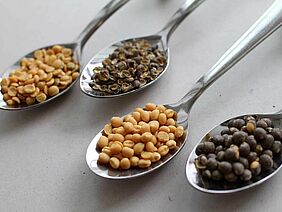We depend on plant protein from legumes for our food and our feed. But in Europe we face a fundamental challenge: a protein deficit that amounts to a net import of about 15 million tonnes of plant protein for the European Union. There is justified concern in the agri-food sector that imported legumes, especially soybean, are produced under low environmental and social standards.
The cultivation of legume crops such as soybeans, lupins, peas and many others helps to diversify cropping systems, reduces European reliance on imported plant protein and creates value in rural regions. Due to the low production volume of legumes, European farms forfeit the agricultural, economic and environmental benefits of more diverse cropping systems. A crucial part of the solution is developing the legume production in the European Union and Switzerland itself. It is where the Legume Hub comes into play – an online platform coordinated by the Legumes Translated project, a European Union Horizon 2020 project, and the newly established European Legume Hub Community.
Matthias Klaiss, Senior Advisor at FiBL Switzerland, explains “FiBL’s role in the Legumes Translated project includes leading Work Package 6 ‘Communications and impact’, facilitation of production of educative extension videos by project partners, providing know-how of the Swiss actor groups. They share insights to stimulate innovations along organic soya and lupin value chains, from crop production to product commercialisation”.
The Legumes Translated project
The Legume Hub was developed in the Legumes Translated project funded by the European Union’s Horizon 2020 Programme for research, technological development and demonstration under the grant agreement No. 817634. The consortium comprises 17 partners in 9 countries with 14 local innovation groups.
The Legume Hub philosophy: shared knowledge, shared ownership
The Legume Hub is a knowledge platform to empower all interested in the development of legume cropping and use with access to knowledge, insight and successful practices across value chains – from plant breeding, on-farm activities, to processing and consumption. Users include breeders, farmers as growers and users of legumes, processors for feed and food purposes, and all involved in the related parts of the value chains. Members of the Legume Hub Community use the Hub to disseminate articles, research reports or videos. “The Legume Hub is about empowering an innovation community with understanding from shared knowledge. Its launch is a milestone for the use of legume cropping in the sustainable development of our agri-food systems”, says Donal Murphy-Bokern, Lead Editor and Chairman of the Legume Hub Community.
Invitation: Join the Legume Hub Community
All who have relevant practical or research-based expertise are invited to register and thereby join the Legume Hub Community. All members can use the Legume Hub to publish articles. They can also use the Hub to disseminate existing research reports or videos. Contributors, their projects and organisations are given maximum recognition on the Legume Hub – each article is attributed to its author(s) and their organisations. Each is citable as a scientific or technical publication. In addition, members can extend their involvement by joining the editorial board and by contributing to the review of the Legume Hub’s content and its direction. All editorial work is acknowledged in each author’s personal profile on the Legume Hub.
As a community-run publishing platform, the Hub has been designed for all relevant project consortia and teams, all are invited to join the Legume Hub Community and use the Hub to support their communication and publishing activities.
The European Legume Hub Community works with the European Commission and the European Innovation Partnership for Agriculture (EIP Agri) to ensure that the Legume Hub is well-known as a route to impact for EU-funded research consortia and provides a voice to its members as an association of scientists and technologists in public debate about the development of legume-supported cropping.
Further information
Contacts
Links
- legumehub.eu: Legume Hub homepage
- legumehub.eu: Press release on the Legume Hub
- fibl.org: Legumes Translated project
- legumestranslated.eu: Legumes Translated project website






